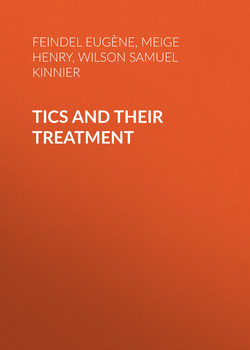Читать книгу Tics and Their Treatment - Feindel Eugène - Страница 13
CHAPTER III
THE PATHOGENY OF TIC
TIC AND CONSCIOUSNESS
ОглавлениеAccording to Guinon, proof that "convulsive" tic is conscious is furnished by the accurate description and rational explanation patients supply of their affliction. Similarly Letulle's "co-ordinated" tic is a conscious act, at least in its commencement; it is a "bad habit" which finally passes beyond the limit of consciousness.
Now, while no doubt most subjects show a keen appreciation of their tic when their attention is directed to it, they are none the less unconscious of it at the moment of its manifestation. This is the ground on which Letulle bases his statement that all tics, of whatsoever variety, are habitually outside the domain of consciousness. To this fact so much importance has been attached that the attempt has been made, more especially by Blocq and Onanoff,15 to differentiate the conscious from the unconscious tic.
In our opinion, the distinction is ambiguous and tends needlessly to complicate our ideas on the subject. The patient with "convulsive" tic is conscious of it in the sense that he is well aware of its existence, yet how can the gesture be a conscious one if it is synchronous with mental preoccupation? On the other hand, the patient with "co-ordinated" tic may bite his lips unconsciously, but he is by no means ignorant of his little failing.
This divergence of opinion depends entirely on the possibility of regarding the phenomena at different moments during their production. The subject is in a position to appreciate his state both before and after the tic, not during it. In a sense it may be said that tic is alternately conscious and unconscious, in which respect it is comparable to the obsession; the close analogy between the two conditions we shall indicate more fully later. As a matter of fact, the same holds true for every variety of spasm.
We are not disposed to introduce here a term sacred to the psychologist and to speak of the tic as subconscious. Pierre Janet does not admit the absolute unconsciousness of habit; even when the latter has degenerated into a tic, it is not outwith the realm of consciousness. We prefer not to venture, however, into the perilous region of the subconscious, in spite of our appreciation of the happy results attributable to its careful and discerning exploration by observers such as Janet himself.
According to Cruchet, certain so-called psychical tics are always subliminal – for instance, the imitation tics common in children and in idiots.
But if the consciousness of the normal adult be, as it admittedly is, a most elusive conception to define, how infinitely more precarious is the task in the case of idiots or infants! Cruchet says it is impossible to be sure whether at any given moment a tic has been above the threshold of consciousness or not; and we do not think the question will be elucidated by the introduction of data so difficult to comprehend as the consciousness, unconsciousness, or subconsciousness of the tic patient. In any case, these conceptions are quite inadequate for the establishment of useful distinctions. All that we can say is that the participation of consciousness in the phenomena of tic varies in time and degree. To hazard farther would be to invite disaster.
15
BLOCQ and ONANOFF, Maladies nerveuses, 1892.
